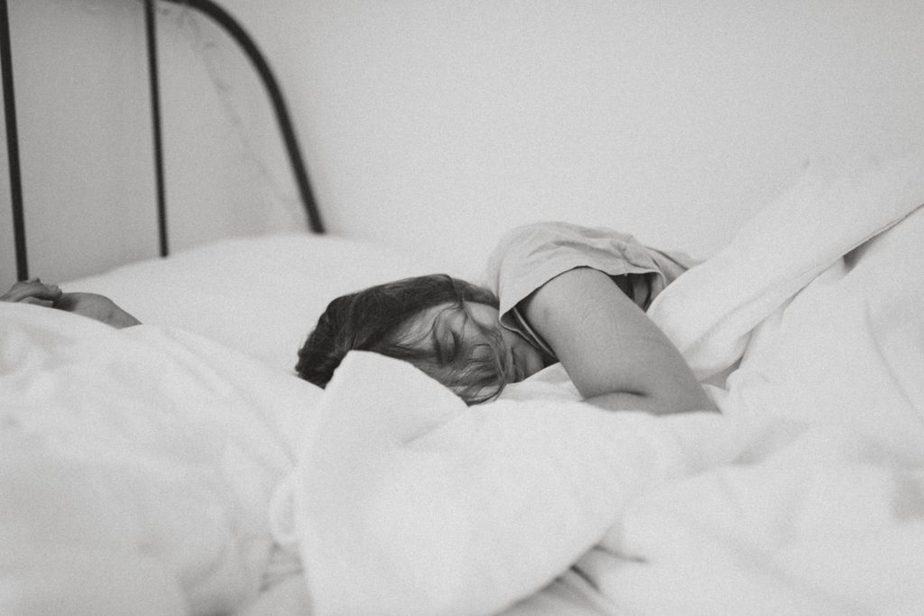Table of contents
Nebula Genomics DNA Report for Insomnia
Is insomnia genetic? We created a DNA report based on a study that attempted to answer this question. Below you can see a SAMPLE DNA report. To get your personalized DNA report, purchase our Whole Genome Sequencing!
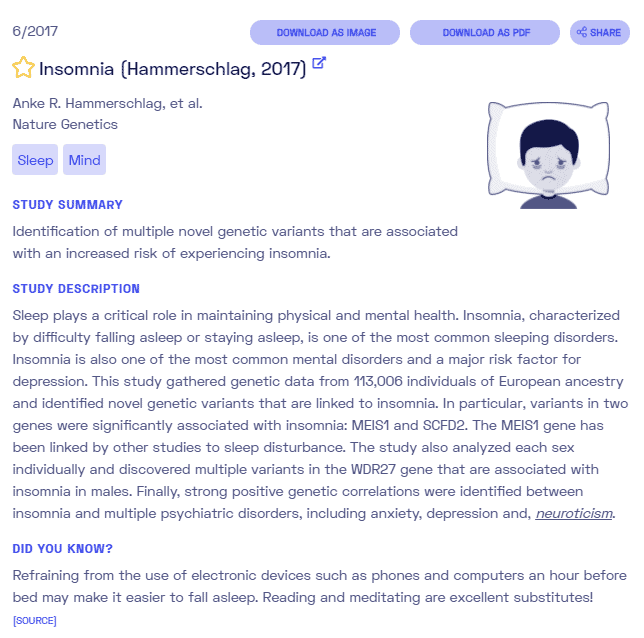

What is Insomnia?
The term insomnia refers to a disorder in which an individual has trouble sleeping, either through difficulty falling asleep or staying asleep. These are normally the basis of the first two questions a healthcare professional asks to diagnose the condition. Causes can be external (such as noise at night, excessively bright street lighting), behavioral, or biological factors.
The lack of restful sleep impairs mental performance at work and school. It can also lead to the worsening or recurrence of diseases in the medium or long term. In addition, experts believe the condition is a significant factor in many car crashes and results in a wide range of injuries and disabilities.
Lack of sleep has also been found a culprit in major events such as the Challenger and Chernobyl disasters. Most people with the condition will notice daytime drowsiness, low energy, irritability, and a depressed mood.
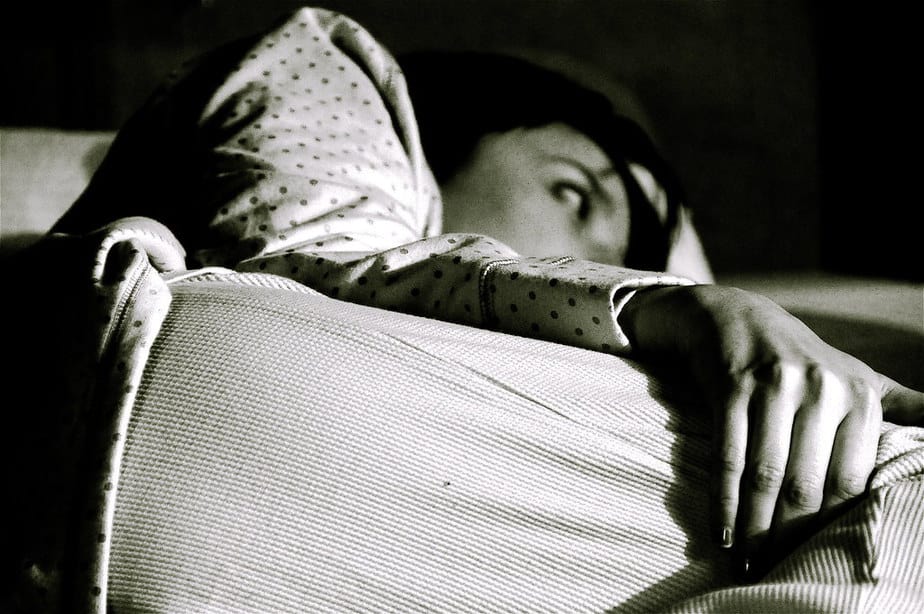
In many cases, the condition will be the result of a different disease or illness. By treating the underlying condition, patients tend to see their insomnia improve as well. If a doctor diagnoses a sleep disorder, behavioral and cognitive therapy are usually the first treatment options available. While sleep medications are available, their effectiveness may not be worth the risk of injuries or addictions associated with long-term use of these drugs.
Is Insomnia Genetic?
Common insomnia is a combination of genetic and environmental factors. The condition tends to be common in family members, suggesting an inherited component. Overall, experts think that many genes are linked to insomnia to various degrees.
A research study published in February 2019 in Nature Genetics analyzed data that identified 57 genetic regions thought to increase the risk of insomnia. The lead on the genome-wide association study was Jacqueline Lane, a researcher at the Center for Genomic Medicine at Massachusetts General Hospital in Boston.
Fatal familial insomnia (FFI) is a rare genetic degenerative brain disorder. Insomnia associated with this condition starts mild but becomes progressively worse until physical and mental capacities deteriorate. Most patients notice onset around 40-60 years of age, and the disease is fatal in 6-36 months. This disease affects the prion proteins in the thalamus, a brain region that controls the sleep-wake cycle.
As a whole, prion diseases are rare. In total, experts think all prion diseases affect about one person per million people in the general population per year. Thus, this condition is extremely rare.
FFI is caused when the PRNP gene does not work correctly. This gene regulates the production of the human prion protein. Alterations in this gene lead to the generation of abnormally-shaped prion protein, which is toxic to the body.
In FFI, the abnormal prions build up primarily within the brain’s thalamus. This leads to the progressive loss of nerve cells (neurons).
The mutation is inherited in an autosomal dominant pattern meaning that an individual needs to inherit only one copy of the mutation from either parent to have the condition. It can also happen sporadically, without an inherited component. But, again, either of these conditions is extremely rare in the general population.
Current Research on Insomnia
While it is clear that specific behavioral patterns could trigger insomnia, experts believe it also has genetic predispositions. Research in this field is scarce, but fortunately, a number of studies have provided useful results on these questions.
Following research in 2018 summarized by Science Daily, researchers identified specific genes that seem to trigger sleep problems and linked the AUTS2 as one of them. The AUTS2 is also responsible for insomnia and other psychiatric disorders such as depression and physical conditions such as type 2 diabetes. The study found that insomnia did have a genetic leaning, but genes are not the only conditions responsible for it.
New research, such as this article published in 2019, suggest that both SNPS and systems such as ubiquitin mediated proteolysis play a significant role in the condition.
GWAS
A 2018 research published in Molecular Psychiatry revealed that insomnia and sleep disorders are genetically related. Murray Stein of the University of California San Diego and the VA San Diego Healthcare System championed this research. The focus sample was large respondents across the United States.
Stein and his research team performed genome-wide association studies (GWAS). The authors analyzed a large range of data, including DNA samples obtained from more than 33,000 soldiers participating in the Army Study To Assess Risk and Resilience in Servicemembers (STARRS). Also, they grouped data from soldiers of European, African, and Latino descent separately to identify the influence of specific ancestral lineages. Stein and his colleagues also compared their results with two recent studies that used data from the UK Biobank.
From the study, Stein and his team concluded that insomnia had a partially heritable basis. Among participants of European descent, there was additionally a genetic tie between sleeplessness and major depression.
Stein and his team linked insomnia to the occurrence of specific variants on chromosome 7. In people of European descent, there were also differences in chromosome 9.
Review
According to a review published in 2012, the heritability of sleep patterns has been shown in twin studies. Also, there was promising evidence that sleep electroencephalogram patterns offer a unique genetic fingerprint that may assist in identifying genes involved in the regulation of sleep. The study showed that recent genetic advances showed that Hypocretin/ Orexin System plays a major role in sleep disorders.
Citing insomnia specifically in a string of sleep disorders, the study also stated that the neuro-genetic condition, FFI, is predominantly due to mutation in codon D178N of the prion protein (PrP) gene. The gene is said to be the cause of special thalamic nuclei degeneration.
Epidemiology
In the United States, anywhere from 20 percent to 40 percent of adults report symptoms of insomnia at some point in a given year. Out of all adults, 9.5% report short-term insomnia. However, experts found that the condition continues in 40% to 70% of patients for as long as four years.
According to the American Insomnia Survey in 2008-2009, more than 50% of adults had difficulty sleeping, and 22.1% met the diagnostic criteria for insomnia. In addition, the condition appears to be more common in women than in men. It is also more prevalent in the elderly population, individuals with low socioeconomic status, and those with poor health or low quality of life, suggesting that social and societal stress may be involved.
Short sleep (defined as getting less than 7 hours of sleep within 24 hours) is most common in the eastern portion of the United States.
Symptoms
Insomnia is a common disorder with the main symptoms being the inability to fall and stay asleep.
There are two types of insomnia: short-term and chronic. Short-term forms of the condition last only a few days or weeks and usually are stress-related. When it becomes chronic, occurring at least three nights a week and lasting for three months or longer, doctors may associate the sleep disorder with an underlying condition.
Chronic insomnia symptoms include:
- Difficulty falling asleep and/or waking up too early
- Difficulty returning to sleep
- Feeling tired/fatigued during the daytime
- Irritability or depressed mood
- Problems with concentration or memory
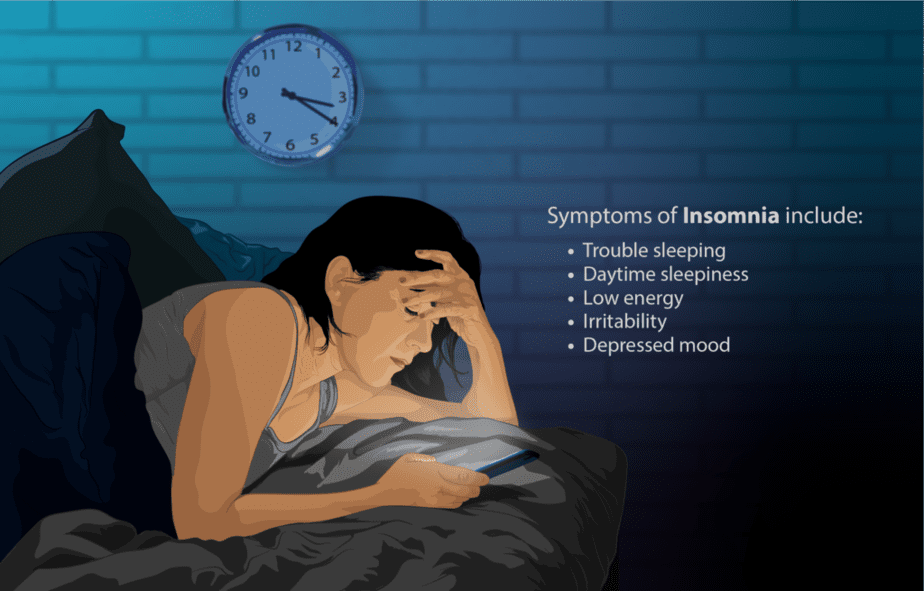
Experts link not getting enough sleep to several common chronic conditions such as type 2 diabetes, heart disease, coronary artery disease, obesity, and depression.
Although symptoms persist in some patients, others may experience it as a waxing and waning condition.
Causes
The cause of your condition depends on the type.
Doctors normally attribute acute insomnia, when people suffer from insomnia for a short amount of time, to certain life events. Stress (job, relationship, financial, etc.) is usually the most common cause of poor sleep. Taking care of your mental health is often a key aspect of improving sleep. Other risk factors in the short term include experiencing a traumatic event, changes to sleep habits or environment, physical pain, jet lag, and certain medications.
Chronic insomnia, which lasts longer than three months, usually has an underlying condition. In some cases, when there is no known cause, doctors refer to it as primary insomnia. Oftentimes, a patient will experience secondary insomnia, which can be caused by:
- Chronic pain such as occurs with arthritis or back pain
- Psychological issues, such as anxiety disorders or depression
- Substance use
- Sleep apnea
- Diabetes
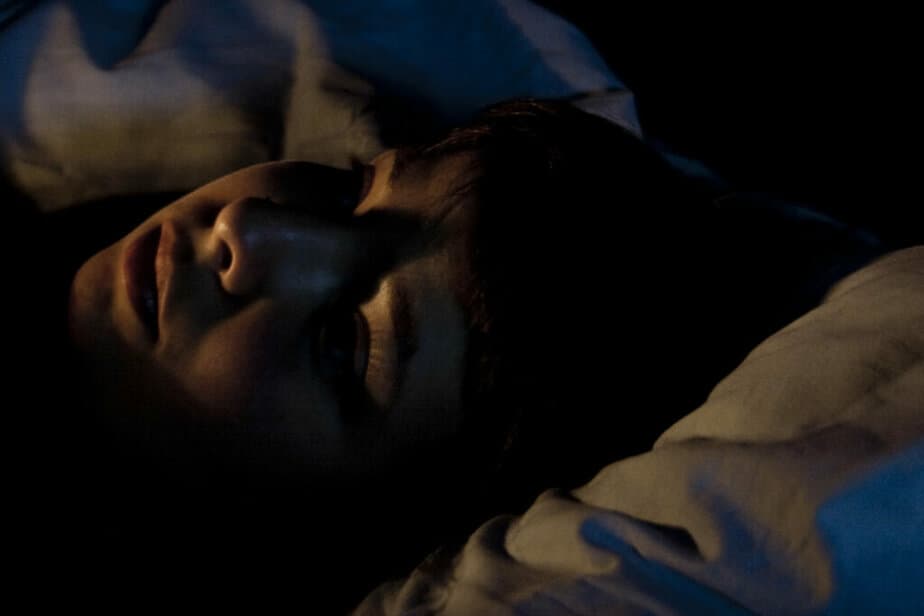
Risk factors
Some people may be at higher risk of developing insomnia than others. Specifically, patients who have risk factors such as lifestyles or who suffer from certain disorders are more prone to sleep problems, including those with:
- High levels of stress
- Emotional disorders, such as depression or distress related to a life event
- Lower income
- Traveling to different time zones
- Sedentary lifestyle
- Changes in work hours or working night shifts
- Obesity
- Cardiovascular disease
- Menopause
Diagnosis
For a doctor to make a diagnosis of insomnia that is not part of an underlying medical condition, they will often start by asking you questions regarding your medical history, family history, sleep patterns, and environment. Questionnaires that focus on things like when you go to bed, how long it takes you to fall asleep, and whether you feel rested are also helpful.
They use a physical exam to look for signs of other health problems. Listening to the heart and lungs is often crucial in diagnosing sleep apnea. Sometimes, they recommend a blood test to diagnose certain health conditions, like a thyroid disorder, especially if you have other symptoms.
Oftentimes, your doctor might recommend a review of your sleep habits by completing a sleep diary for 1-2 weeks. You can find templates for sleep diaries online. Usually, you will take note of when you fall asleep, wake up, how drowsy you feel throughout the day, when you drink caffeine and alcohol, and when you exercise. This sleep history can help your doctor determine if certain habits are affecting your sleep.

If there is no underlying cause and your doctor suspects you have a sleep disorder such as sleep apnea, narcolepsy, a circadian rhythm disorder, or restless leg syndrome, they may recommend a sleep study. In this case, you will spend the night in a sleep center, where doctors can monitor and record your sleeping. The measurements include brain waves, breathing, heartbeat, eye movements, and body movements.
There are certain sleep centers all over the United States that have specialists who can help with diagnosis.
Treatment
The first approach to treat insomnia is usually a change to sleeping habits and other lifestyle aspects that affect sleep such as stress and medications. If those treatments are not effective, you may be referred to cognitive behavioral therapy, sleep medications, or both to help get a good night’s sleep.
Cognitive behavioral therapy for insomnia
Cognitive behavioral therapy for insomnia (CBT-I) helps you control or eliminate negative thoughts, worries, and actions that keep you awake. It can help you realign how you think about certain stressful things in your life to promote good sleep. It also allows you to take action to develop good sleep habits that can lead to a better night’s rest.
There are several strategies to CBT-I. You may be asked to try all or some of them. One strategy is stimulus control therapy, in which you are coached to remove factors that prevent sleep. An example would be setting up a consistent sleep schedule.
Relaxation techniques are another common approach in which muscle relaxation, biofeedback, hypnosis, meditation, and breathing exercises help physically prepare the body for rest.
Sleep restriction is another technique that may be used. Doctors may recommend this for patients who spend a lot of time awake in bed, trying to fall asleep. In this approach, you will be asked to restrict sleep to certain times in a way that causes you to be slightly sleep-deprived and thus increase your drive to sleep in bed. Then, once you spend most of your time in bed sleeping, you progressively add more time.
For example, if you are trying to sleep 8 hours a night but only getting 5 hours, you would start by adjusting your bedtime routine to 5 hours and 30 minutes in bed.
Medications
Prescription medications can be used to help patients fall, stay asleep, or both. However, this option comes with several side effects including daytime grogginess and increasing the risk of falling. They can also be habit-forming, so you should be sure to follow the instructions provided carefully. In most cases, they will be prescribed for only a few weeks.
Several studies have looked for new therapeutic targets to better help those with sleep trouble. As of now, few of these studies have led to new drugs.
Some people use nonprescription drugs that contain antihistamines to induce sleep. Patients should obtain medical advice before using these medications as sleep aids since this is not their intended use. They can cause daytime sleepiness, dizziness, confusion, cognitive decline, and difficulty urinating.
If you liked this article, you should check out our other posts in the Nebula Research Library!
February 17, 2023
